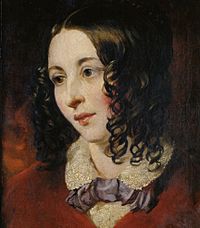Eliza Cook facts for kids
Quick facts for kids
Eliza Cook
|
|
|---|---|

Portrait by William Etty, c. 1845
|
|
| Born | 24 December 1818 London Road, Southwark, England |
| Died | 23 September 1889 (aged 70) Wimbledon, England |
| Period | 1830s–1880s |
Eliza Cook (born December 24, 1818 – died September 23, 1889) was an English writer and poet. She was connected to the Chartist movement, which worked for better rights for working-class people. Eliza believed that women should have political freedom. She also thought that people could improve their lives through education. She called this "levelling up." Because of these ideas, she became very popular with working-class people in both England and America.
Contents
Early Life
Eliza Cook was the youngest of eleven children. Her father worked with brass. She was born in London Road, Southwark, England. When she was about nine years old, her family moved to a small farm. This farm was near Horsham in St. Leonard's Forest.
Eliza's mother encouraged her love for books and stories. Even though she went to Sunday school, Eliza mostly taught herself. At Sunday school, a music teacher's son encouraged her to write poetry. She started writing verses before she was fifteen. She sent her poems to newspapers like the Weekly Dispatch. Her first poetry book came out when she was seventeen. Some of her most famous poems, like "I'm afloat," were written when she was still a girl.
Writing Career
Eliza's first book of poems, Lays of a Wild Harp, was published in 1835. She was only seventeen. People liked her book, so she started sending poems to other magazines. She often sent them without her name at first. Later, she wrote mainly for the Weekly Dispatch. Her first poem there appeared in 1836. She wrote for this paper for ten years.
Her poem The Old Armchair (1838) made her very famous. Everyone knew her name in England and the United States. In the same year, she published Melaia and other Poems.
Other newspapers sometimes copied her work without permission. For example, the Northern Star, a Chartist newspaper, copied her poems. Eliza was familiar with the Chartist movement in London. She believed in self-education and friendly groups for workers.
From 1849 to 1854, Eliza wrote and published Eliza Cook's Journal. This was a weekly magazine that she said was for "utility and amusement." People described it as interesting and helpful. However, it did not last long because not enough people bought it. Eliza tried hard to keep it going, but it stopped due to health issues and a lack of readers.
Later, Cook published Jottings from my Journal (1860). This book included many of the things from her earlier magazine. It was one of the few times Cook wrote in prose, which means in regular sentences and paragraphs, not poetry. The book had essays and short stories. They were written clearly and simply. They often taught a moral lesson. Some of her essays made gentle fun of social problems of her time. They showed she had good sense and humor.
She also published New Echoes and Other Poems in 1864. This book was not as popular as her earlier works. Even so, Eliza Cook's poems were included in many poetry collections throughout the 1800s.
Her Beliefs
Eliza Cook was a Chartist. Chartists were English reformers in the 1800s. They wanted better social and working conditions for the working class. Chartist poetry aimed to create a feeling of togetherness among people who felt unfairly treated.
In her poem "A Song for the Workers," Cook wrote about the need for shorter working hours. She compared how workers were treated to how slaves were treated. In another poem, "Our Father," Cook spoke out against child labor. She said that hard jobs made children's minds "dull." She believed children should be allowed to be children. Her strong views made her very popular with working-class people.
Later Life
Eliza Cook was a close friend of the American actress Charlotte Cushman.
In 1863, Eliza Cook started receiving a pension from the government. This meant she got £100 a year to help her live. After this, she wrote only a few more poems. She became very ill and was described as a "confirmed invalid." Even though she was not as popular, she still earned money from her books until near the end of her life.
In the 1870 census, she was living in Wimbledon, Surrey. She lived with her maid, her sister, her nephew, his wife, and their daughters. Eliza's health problems stopped her from writing new things or changing her old works. After many years of illness, she died at her home on September 23, 1889. She is buried at St. Mary's Church in Wimbledon.
Works
- The Fair Rose of Killarney – A Ballad – By Miss Eliza Cook – Music by Stephen Glover (New-York Mirror Saturday 29 June 1839 pp 32) [1]
- Her article "People Who Do Not Like Poetry" (May 1849) can be found in the book A Serious Occupation: Literary Criticism by Victorian Women Writers ISBN: 1-55111-350-3.
- Poems (1859, poems)
- "The Heart That's True" was set to music in 1857 by Australian composer George Tolhurst
 | Frances Mary Albrier |
 | Whitney Young |
 | Muhammad Ali |

